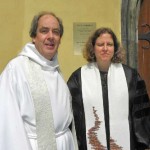St. Clement’s Church, Prague, where the English-speaking Anglican congregation worship, does not belong to us – it belongs to the Ceskobratrské Cíckve Evangelické / the Evangelical Church of Czech Brethren. They are a joint Lutheran/Reformed Church and by far the largest protestant grouping in the Czech Republic. The CCE have their service at 09.30 each Sunday – we therefore have ours at 11.00. We pay them a very modest rent for the use of their Church building.
Over the past few weeks, the CCE have arranged for the various exterior doors of the Church building to be taken down, one pair at a time, so that they can be taken away and renovated. Initially it was the west doors, ones which we rarely use. Then it was the south doors, the entrance our congregation normally do use. Now the south doors are back, the external vestry door has been taken away & that entrance temporarily blocked up.
The company carrying out the renovation are clearly keen that both people walking past the Church, and those who worship there, should know who is carrying out the restoration work on the doors. And so they have made a board which has been erected in front of each entrance to the Church, whilst the doors for that particular entrance have been missing. Realising that an English-speaking congregation also use the Church, somebody in the hierarchy of Restaurátorské Dílny Zbraslav S. R. O. obviously decided that this notice should not only be in Czech but also in English. But as you can see – it isn’t in English. It is in Czenglish!!!!!
Czech speakers are extremely quick to correct any foreigner who fails to decline a noun or adjective correctly when trying to speak Czech. Yet many of those self-same people regularly make an absolute shambolic mess of the English language, reproducing their various mistakes in menus and notices like this one, with absolutely no realisation of how ridiculous their attempts at written English actually read and sound.
Therefore, for the benefit of the management of Restaurátorské Dílny Zbraslav S. R. O., and for any other Czech person reading this blog post, ‘Restore works on this object are made by’ is completely incorrect English! ‘Restoration work on these doors is being undertaken by’ or ‘Work to restore these doors is being carried out by’ is what should have appeared on this notice. One simple phone call to me would have been all that was required for Restaurátorské Dílny Zbraslav S. R. O. to avoid appearing absolutely stupid.
Can someone please explain to me why so many Czech people are so unwilling to ask a native English-speaker to check their English text before putting it into print? If you really want to make an impact on English-speakers, please try writing in English and not in Czenglish!







Hehehe. Job security.
Karen – If you are suggesting that there is a full-time job for someone to change Czenglish into English then I would wholeheartedly agree!
It is the same on Paros. My friends and I giggle and sometimes roar with laughter over the stupid mistakes on menu’s and notices posted on billboards. We have often wondered why they don’t ask English speakers who live on the island for help. Pride, perhaps? We have noticed when something is translated from Greek into English that it becomes much shorter, meaning that the Greeks use a lot of “flowery” words and English appears to be much more concise.
Hi Ricky – I am really enjoying your blog and this in particular – I am not one to criticise, as I find Czechs in Prague have a generally really high level of English (certainly higher than my Czech anyway!) but I do get a giggle out of Czenglish!
Hi Helen,
Thank you for visiting and commenting on my blog. I’m glad you’re enjoying it, particularly all my examples of Czenglish.
You are quite right in saying that many Czechs in Prague, (particularly younger ones), have quite a high level of English. But it is usually good spoken English which doesn’t mean that they can then produce good, accurate written English, suitable for menus or noticeboards. Often they literally translate words, as for example here with ‘objektu’ being translated as ‘object’, with no awareness that you just don’t say or write that in English in this context.
I know (or have known), several first-language English speakers who have learned Czech and make a living translating from Czech to English but NOT the other way around. This is simply because they are very aware of not being native Czech-speakers.
Congratulations on starting your own blog which I shall enjoy reading.
Just saw this on Wordsmith’s ‘Thought for the Day’ I subscribe to and had to laugh:
A THOUGHT FOR TODAY:
Arguments over grammar and style are often as fierce as those over Windows versus Mac, and as fruitless as Coke versus Pepsi and boxers versus briefs. -Jack Lynch, English professor, author (b. 1967)
Hello,
One good example of Czenglish to look out for is a liquor store at the Mustek end of Wenceslas Square. It’s a more upmarket style shop and underneath the Czech title it says ‘Spirit of the World’. As there is a large selection of bottles of booze on display I think they may mean ‘Spirits of the World’.
I can’t criticize too much as I still put an ‘S’ on the end of any Czech words to indicate plural. such as bananys, jizdenkys or rohlikys. It really winds up my Czech girlfriend, which I think is why I do it.
Great blog! Cheers!
Hi Michael,
It is amazing how even so-called ‘upmarket’ restaurants and shops, are so careless when it comes to putting things into English. With regard to plural words, I always laugh when I see an English word, adopted into Czech, being made plural by the addition of the letter ‘y’. Thus you get snowboardy, chipsy, snacky etc. See my very early post http://rickyyates.com/the-addition-of-the-letter-y/ .
Glad you enjoy the blog!
I agree. I myself have been often flabbergasted and wondered why on earth the pertinent people do not consult someone, if not a native speaker, then at least someone with a decent mastery of the language. It seems such a simple thing to do.
But, to turn the tables for just a bit, I must also say that as a foreigner, I used to get similarly flabbergasted by the mistakes that English native speakers (true, of the American variety, perhaps it’s different in Britain) make that seem to betray basic lack of understanding of the logic (grammar) of the language, such as “there” instead of “their” and “your” instead of “you’re,” and the utterly incomprehensible one for me: “should of” instead of “should have” (well, actually, I do understand, it’s about sort-of-phonetic transcription in all cases, but still). Now I’m not flabbergasted anymore; I got used to them — even coming from college graduates.
Hi Alena, Thank you for your kind words of support in the first paragraph of your comment. I suspect both from your name and what you say, that you are not a first language English-speaker, which makes me appreciate your comment even more!
And I also 100% endorse what you say in the second paragraph of your comment. I too, am appalled at the way many native speakers of English cannot write or spell correctly in a similar manner so well illustrated by the examples you’ve given. Also, I wouldn’t just blame Americans – British people can be just as bad in their abuse of their native tongue. Please note that I got my ‘theirs’ spelt correctly in that last sentence 🙂 In particular, if you write something in English for the public domain such as a blog, if you want to be read and appreciated, the least you can do is write in correctly spelt standard English.